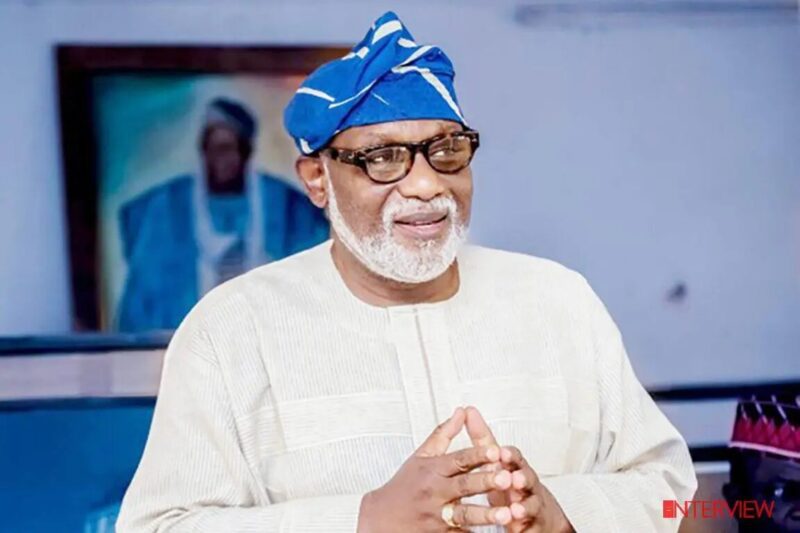Political Issues
Ondo’s Political Turmoil: Aiyedatiwa Sworn In Amidst Constitutional Controversy – Navigating the Aftermath and Drawing Lessons for the Future -By John Egbeazien Oshodi
The Ondo State crisis provides valuable lessons for political leaders on the importance of ethical decision-making, adherence to constitutional provisions, and the need for comprehensive governance plans. Leaders can learn from this experience to strengthen democratic practices and ensure the smooth functioning of government during challenging times.

In the disheartening saga of Nigeria’s political landscape, once hailed as a model for other black nations, a distressing narrative of political dishonesty, family power dominance, and the unscrupulous pursuit of influence has taken center stage. Psychologically, I attribute this decline to what I term “political dishonesty,” a phenomenon that has not only eroded Nigeria’s potential as a positive model but has also led to a troubling transformation.
The recent events in Ondo State, particularly the handling of Governor Rotimi Akeredolu’s illness and subsequent passing, vividly exemplify this narrative. His prolonged ailment became a breeding ground for political and legal maneuvering, marked by family power plays, corrupt practices, and the concoction of dubious charges. This unfortunate situation not only diverted valuable resources from meaningful development but also plunged the state into a web of emotional politics, leaving a lasting impact on the political landscape.
In a sequence of events reflecting the intricacies of Nigeria’s political landscape, the recent turmoil in Ondo State has drawn attention to the fragile nature of power transitions. The unfortunate demise of Governor Rotimi Akeredolu, attributed to protracted prostate cancer, unraveled a series of controversies, exposing the pitfalls of familial and political maneuvers that attempted to circumvent constitutional processes.
The saga began with the ailing Governor Rotimi Akeredolu, whose health deteriorated, prompting calls for a temporary transfer of power to the deputy governor, Lucky Aiyedatiwa. However, instead of a smooth transition, the governor’s family and certain political figures apparently engaged in tactics to sidestep constitutional norms.
At the heart of the matter lies a disregard for constitutional norms, with attempts to manipulate the transfer of power and undermine established procedures. Nigeria, as the largest black nation, stands at a critical juncture where ethical governance and adherence to the constitution must take precedence over power struggles, familial dominance, and emotional politicking.
President Bola Tinubu’s intervention acted as a catalyst, urging the authorities to allow the rightful deputy governor to assume the role temporarily. The situation, however, took a tragic turn with Governor Akeredolu’s passing. Now, the nation, especially Ondo state, has no choice regarding the unavoidable task of swearing in Deputy Governor Aiyedatiwa to avoid further constitutional chaos.
In the aftermath of these events, it becomes imperative for Nigeria to move forward, leaving behind such controversies that tarnish the democratic process. The case of Ondo should serve as a learning point, emphasizing that democratic values must prevail over familial and political ambitions. As the new governor takes office, there is a collective responsibility to ensure that the constitution remains the guiding force in governance, preventing such constitutional crises in the future.
This crisis demands a broader national conversation on political reforms, emphasizing transparency, adherence to constitutional provisions, and the development of robust mechanisms to ensure the smooth transition of power. Nigeria cannot afford to witness similar episodes in the future, and it falls upon the collective responsibility of citizens and leaders alike to champion these reforms.
The Ondo State crisis provides valuable lessons for political leaders on the importance of ethical decision-making, adherence to constitutional provisions, and the need for comprehensive governance plans. Leaders can learn from this experience to strengthen democratic practices and ensure the smooth functioning of government during challenging times.
Ondo State, once regarded as a potential catalyst for cultural pride and positive change, has become emblematic of the nation’s deteriorating political landscape. The recurring theme of family-centric politics, combined with underhanded tactics and trumped-up charges, has tarnished the nation’s image, not only within Ondo but across the nation, with family members interfering in governmental affairs and causing embarrassment. As a result, Nigeria is losing its standing as a role model for other nations, reinforcing the urgent need for a reassessment of political practices.
This chain of events underscores the urgency for comprehensive reforms in Nigeria’s political landscape. The nation cannot afford to continue down a path where constitutional processes are disregarded, leading to crises and power struggles. The Ondo incident serves as a stark reminder that reliance on influential figures for crisis resolution is not a sustainable solution.
This call for change is not just a plea for Ondo State but a resonating demand for the entire nation. It is time for Nigeria to reclaim its status as a positive model, focusing on ethical governance, transparency, and the genuine pursuit of the people’s welfare. The prevalence of political dishonesty and the erosion of constitutional values must be collectively addressed to pave the way for a brighter, more dignified future for the nation.
As we bid a heartfelt farewell to Governor Rotimi Akeredolu, encompassing not only the presidency and the Senate but also extending to all facets of government, including the diligent forces within the police and military, let this poignant moment resonate as a profound reminder that power is inherently fleeting, and no individual, regardless of stature, is immune to fallibility. Democracy, deeply entrenched in the principles of accountability, transparency, and unwavering fidelity to constitutional norms, demands our steadfast commitment to ensure the enduring prosperity of our beloved nation. May these profound insights serve as beacons, guiding us on the journey toward ethical governance, where the welfare of the people takes center stage as the paramount and unwavering objective.

Professor John Egbeazien Oshodi, who was born in Uromi, Edo State, Nigeria, to a father who served in the Nigeria police for 37 years, is an American-based police and prison scientist and forensic, clinical, and legal psychologist. A government consultant on matters of forensic-clinical psychological services in the USA; and a former interim associate dean and assistant professor at Broward College, Florida. The Founder of the Dr. John Egbeazien Oshodi Foundation, Center for Psychological Health and Behavioral Change in African Settings. In 2011, he introduced state-of-the-art forensic psychology into Nigeria through N.U.C. and Nasarawa State University, where he served in the Department of Psychology as an Associate Professor. He has taught at various universities and colleges including Florida memorial University, Florida International University, Broward college, Lynn University, and a contributing faculty member at the Weldios university in Benin Republic, Nexus International University, Uganda, Nova Southeastern University and Walden University in USA. He is a Human Rights Psychologist with a focus on African related environments. joshodi@nova.edu



















